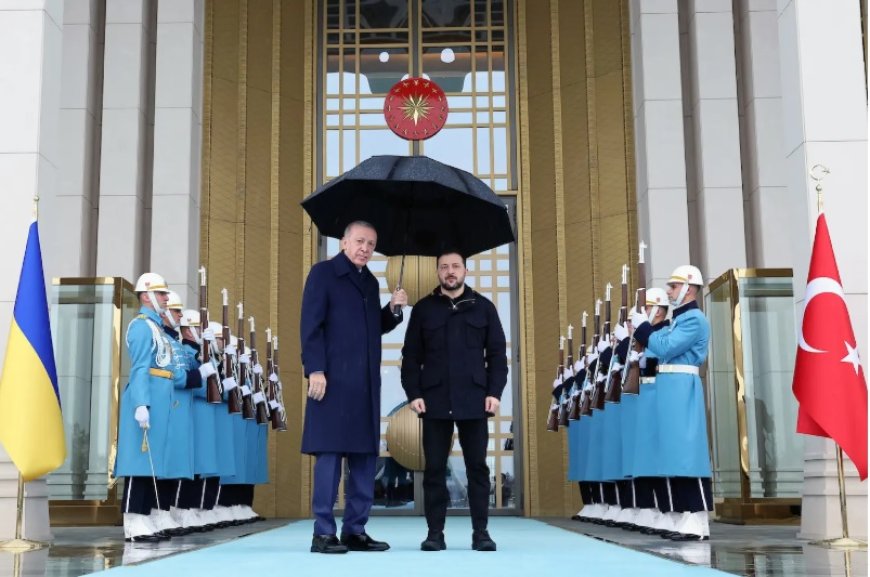Turkey and Ukraine's Free Trade Agreement: A Strategic Turning Point?
A potential Free Trade Agreement between Turkey and Ukraine could redefine economic and geopolitical ties, fostering investment, regional stability, and reconstruction efforts in Ukraine. This analysis explores its implications on trade, free movement, and international law.

Turkey and Ukraine's Free Trade Agreement: A Strategic Turning Point?
YUSUF İNAN / YEREL GÜNDEM / TÜRKİYE - UKRAINE
Zelensky Invites President Erdoğan to Ukraine: A New Era of Strategic Cooperation?
Ukrainian President Volodymyr Zelensky has officially invited Turkish President Recep Tayyip Erdoğan to Ukraine, proposing a landmark Free Trade Agreement (FTA) between the two nations. This potential agreement carries significant implications for economic growth, geopolitical alignment, and regional security. As Turkey and Ukraine deepen their ties amid shifting global dynamics, experts weigh in on what this deal could mean for both countries and the broader international landscape.
What Does the Free Trade Agreement Mean for Turkey and Ukraine?
An FTA between Turkey and Ukraine would substantially enhance bilateral trade, eliminating tariffs, facilitating investment, and boosting commerce between the two nations. Turkey, with its robust manufacturing sector, advanced infrastructure, and strategic geographic location, stands to benefit from increased exports to Ukraine, particularly in defense, construction, and technology sectors. Meanwhile, Ukraine, in urgent need of economic revitalization post-conflict, could leverage Turkey's investment potential and industrial expertise to accelerate its rebuilding process.
From an economic perspective, free trade agreements foster greater market accessibility, reduce costs for businesses, and enhance competition, which ultimately benefits consumers. For Ukraine, alignment with Turkey’s trade ecosystem could complement its European Union integration efforts, providing a diversified economic safety net amid ongoing geopolitical challenges.
Could a Free Movement Agreement Follow?
While the immediate discussions center on trade, experts speculate whether a Free Movement Agreement (FMA) could follow, further deepening ties between Turkey and Ukraine. If implemented, such an agreement would enable easier migration, work opportunities, and cultural exchange between the two nations.
For Ukraine, access to Turkey’s labor market could provide much-needed economic opportunities for its displaced workforce. Meanwhile, Turkish businesses could benefit from skilled Ukrainian labor, particularly in the technology and engineering sectors. Beyond economic gains, an FMA would foster stronger societal ties, facilitating greater political and diplomatic coordination.
Rebuilding Ukraine: Turkey’s Role in Reconstruction
Ukraine’s post-war reconstruction is one of the most pressing international challenges, requiring extensive investment, expertise, and logistical support. Turkey, with its formidable construction industry, could play a pivotal role in rebuilding Ukraine’s critical infrastructure. Turkish firms have a proven track record in large-scale projects, particularly in transport, housing, and energy, positioning them as strategic partners for Ukraine’s reconstruction.
Additionally, Turkish defense companies, including Baykar, which manufactures the renowned Bayraktar drones, could support Ukraine’s defense sector modernization. Strengthening military-industrial cooperation between the two nations could enhance Ukraine’s long-term security capabilities while reinforcing Turkey’s strategic standing in the Black Sea region.
International Law and Strategic Implications
From an international law perspective, an FTA and potential FMA between Turkey and Ukraine would require extensive legal frameworks to ensure compliance with World Trade Organization (WTO) regulations, European Union standards, and international labor laws. As Turkey remains in a customs union with the EU, aligning this agreement with broader European economic policies would be essential to avoid trade conflicts.
Strategically, deeper Turkey-Ukraine ties could shift the regional balance of power. Turkey’s role as a key NATO ally and Ukraine’s aspirations for stronger Western integration suggest that a closer partnership could counterbalance Russian influence in the Black Sea region. Furthermore, Ankara’s ability to mediate conflicts and facilitate diplomatic solutions could bolster Turkey’s international standing as a regional power broker.
Conclusion: A Historic Crossroad for Turkey and Ukraine
The potential Free Trade Agreement—and broader economic and strategic partnerships—between Turkey and Ukraine marks a pivotal moment in their bilateral relations. As both nations navigate complex geopolitical landscapes, this collaboration could serve as a model for regional economic resilience and security cooperation. If successfully executed, the agreement could not only bolster their economies but also contribute to a more stable and interconnected Eurasian corridor.
With President Erdoğan’s forthcoming visit to Ukraine, the world will be watching closely to see whether this ambitious proposal transforms into a long-term strategic alliance, reshaping the economic and political future of both nations.





















